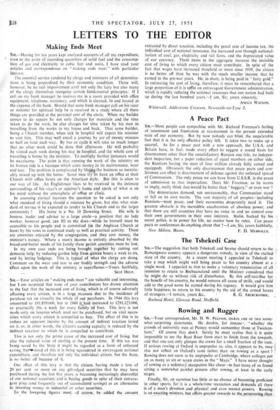LETTERS TO THE EDITOR
Making Ends Meet
gia,—Having for ten years kept analysed accounts of all my expenditure, even to the point of recording quantities of solid fuel and the consump- tion of gas and electricity in cubic feet and units, I have read your articles and correspondence on "making ends meet" with particular ihterest.
The essential service rendered by clergy and ministers of all denomina- tions is being jeopardised by their economic condition. There will, however, be no real improvement until not only the laity but also many of the clergy themselves recognise certain fundamental principles. If I call on my bank manager he receives me in a room provided with office equipment, telephone, stationery, and which is cleaned, lit and heated at the expense of the bank. Should that same bank manager call on his vicar or minister for spiritual help he is received in a study where all these things are provided at the personal cost of the cleric. When my builder comes to do repairs he not only -charges for materials and the time taken to do the work, he also charges for time taken by his men in travelling from the works to my house and back. That same builder, being a Church member, when sick in hospital will expect his minister to visit him. This may-well entail a journey by car of twenty minutes br half an hour each way. By bus or cyete it will take so much longer that no other work could be done that afternoon. He will probably be visited each week during his stay in-hospital, and the whole cost of travelling is borne by the minister. To multiply further-instances would be wearisome. The point is that running the work of the ministry on its human side is a business which costs money in its maintenance, wear and tear. The problem is complicated by hhiag the business so inextric- ably mixed up with the hoine. Some mentrYt o have an office at their Church with office hours on the American style. But this is-alien to our way of life. An Englishman likes to be received in the intimate surroundings of his vicar's or minister's home and speak of what is on his mind without the atmosphere of office or clinic. In assessing clerical incomes the question to be asked is not only what standard of living should a minister be given, but also what stan- dard of *Service is he expected to render to his- Church and to the larger community ? His home is a No. 10 Downing Street. His wife is hostess, leader and adviser to a large circle—a position that no lady worker, however good, can fill as she does—while he himself must be accessible to his people and is committed (in the Anglican Church at least) by his vows to continued study as well as practical activity. These- are amenities enjoyed by the congregation, and they cost money, the minister's money. Where a man's .income is entirely absorbed by the bread-and-butter needs of his family these parish amenities must be lost. In my own case ends are being brought together by cutting out domestic help, by reducing garden help frbuit iixteen hours a week to six, and by letting lodgings. This is typical of what the clergy are doing. Comment on the wear and tear to our bodily strength and the adverse effect upon the work of the ministry is superfluous.—Yours faithfully,
SELF HELP.


































 Previous page
Previous page